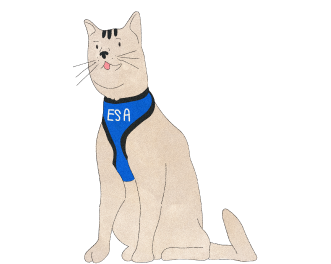If you are struggling with emotional or mental health issues, seeking the companionship of an emotional support animal (ESA) can be an excellent way to alleviate your symptoms and lead a happier, more fulfilling life. In Colorado, there are laws and regulations in place that protect the rights of individuals with ESAs. However, obtaining an ESA in Colorado requires meeting certain criteria and following the proper procedures. In this article, we will discuss everything you need to know about getting an emotional support animal in Colorado.
Understanding Emotional Support Animals (ESAs)
Emotional support animals have gained popularity in recent years as a form of mental health treatment. These animals offer therapeutic assistance to individuals struggling with emotional or mental health issues. ESAs are not considered pets, but rather companions that provide emotional support to their owners.
Unlike service animals, emotional support animals do not require any specific training to perform a task. Instead, their presence alone is enough to provide emotional support to their owner and help them manage their symptoms. This makes them a popular choice for individuals who may not have a physical disability but still require emotional support.
ESAs can come in many different forms, including cats, dogs, birds, and even miniature horses. They are not limited to a specific breed or species, but rather any animal that can provide emotional support to their owner.
What is an Emotional Support Animal?
An emotional support animal is a companion animal that provides therapeutic benefits to individuals with emotional or mental health issues. They are typically prescribed by a mental health professional as part of a treatment plan. The animal’s presence can help alleviate symptoms of anxiety, depression, and other mental health conditions.
ESAs are not considered service animals and do not have the same legal protections. However, they are protected under the Fair Housing Act and the Air Carrier Access Act, which allows individuals to travel and live with their emotional support animals.
Benefits of Having an ESA
The benefits of having an emotional support animal are numerous. Studies have shown that owning an ESA can lower blood pressure, reduce stress and anxiety, improve overall mood and well-being, and provide a sense of companionship and support.
For individuals struggling with mental health issues, an emotional support animal can provide a sense of purpose and responsibility. Caring for an animal can help individuals establish a routine and provide a distraction from negative thoughts and emotions.
Difference Between ESAs, Service Animals, and Therapy Animals
It’s important to understand the difference between emotional support animals, service animals, and therapy animals. Service animals are trained animals that perform specific tasks to help individuals with disabilities. These tasks can include guiding individuals with visual impairments, alerting individuals with hearing impairments to sounds, and providing mobility assistance.
Therapy animals provide support to individuals in hospitals, nursing homes, and other medical facilities. These animals are typically trained to provide comfort and emotional support to individuals in a clinical setting.
Emotional support animals, on the other hand, are companion animals that provide emotional support and comfort to their owners. They do not require any specific training and are not limited to a specific breed or species.
Overall, emotional support animals can be a valuable addition to a mental health treatment plan. Their presence can provide emotional support, companionship, and a sense of purpose to individuals struggling with mental health issues.
Colorado Laws and Regulations for ESAs
In Colorado, there are laws and regulations in place to protect the rights of individuals with emotional support animals. It’s important to understand these laws and regulations to ensure that you are following the proper procedures when obtaining an ESA.
Emotional support animals, or ESAs, are animals that provide comfort and support to individuals with mental or emotional disabilities. They are not the same as service animals, which are trained to perform specific tasks for individuals with disabilities.
Federal Laws for Emotional Support Animals
The federal Fair Housing Act (FHA) requires housing providers to make reasonable accommodations for individuals with emotional support animals. This means that landlords and property managers cannot discriminate against individuals with ESAs and must allow them to live in their rental units, even if the unit has a no-pet policy. The FHA also protects individuals with ESAs from being charged additional fees or deposits for their animals.
In addition to the FHA, the Americans with Disabilities Act (ADA) also provides some protections for individuals with emotional support animals. While the ADA does not specifically mention ESAs, it does require businesses and public places to allow service animals to accompany individuals with disabilities.
Colorado State Laws and Requirements
Like many states, Colorado has its own laws and requirements regarding emotional support animals. According to Colorado law, individuals with emotional support animals have the right to bring their animals into housing units that have a no-pet policy. Additionally, individuals with ESAs have the right to bring their animals on public transportation and into public places.
However, it’s important to note that ESAs are not granted the same rights as service animals under Colorado law. Service animals are allowed to accompany their owners in all public places, including restaurants, stores, and other businesses. ESAs, on the other hand, are only allowed in public places that are deemed “pet-friendly” or where pets are normally allowed.
Housing and Travel Accommodations for ESAs in Colorado
When traveling with an emotional support animal, it’s important to understand the rules and regulations that apply to animals on airplanes and in hotels. The Air Carrier Access Act (ACAA) requires airlines to allow passengers with emotional support animals to bring their animals on flights free of charge. However, airlines may require documentation from a licensed mental health professional verifying that the animal is an emotional support animal.
Similarly, hotels may require documentation from a licensed mental health professional before allowing emotional support animals to stay in their rooms. It’s important to check with the hotel in advance to understand their policies and requirements for ESAs.
It’s also important to note that ESAs are not granted the same rights as service animals when it comes to air travel. While service animals are allowed to accompany their owners in the cabin of the plane, ESAs may be required to travel in the cargo hold.
In conclusion, understanding the laws and regulations surrounding emotional support animals is crucial for individuals who rely on these animals for comfort and support. By following the proper procedures and obtaining the necessary documentation, individuals with ESAs can ensure that their rights are protected and that they are able to travel and live with their animals without discrimination.
Qualifying for an Emotional Support Animal
Qualifying for an emotional support animal requires meeting certain criteria and following the proper procedures. It’s important to understand these requirements before pursuing an ESA.
Emotional support animals, or ESAs, have become increasingly popular in recent years as a means of providing comfort and support to those struggling with mental health conditions. ESAs are not considered pets, but rather, they are seen as a form of treatment for individuals with mental health disabilities.
Eligibility Criteria for an ESA
To qualify for an emotional support animal, you must first have a diagnosed mental health condition that substantially limits one or more major life activities. This can include activities such as sleeping, eating, and socializing. The mental health condition must be recognized by the Diagnostic and Statistical Manual of Mental Disorders (DSM-5).
Additionally, you must be able to provide evidence that your emotional support animal provides therapeutic benefits to you. This can include a letter from a licensed mental health professional, as well as documentation of your mental health treatment history.
Mental Health Conditions That May Qualify
There are many different mental health conditions that may qualify for an emotional support animal, including but not limited to:
- Anxiety disorders
- Depression
- Bipolar disorder
- Post-traumatic stress disorder (PTSD)
- Obsessive-compulsive disorder (OCD)
It’s important to note that not all individuals with these conditions will qualify for an emotional support animal. Each case is evaluated on an individual basis, and it’s up to the licensed mental health professional to determine if an ESA is an appropriate form of treatment.
The Role of Licensed Mental Health Professionals
To obtain an emotional support animal, you must obtain an ESA letter from a licensed mental health professional. This letter must outline the mental health condition you are struggling with and explain how an emotional support animal can provide therapeutic benefits to you.
It’s important to choose a licensed mental health professional who is experienced in working with individuals with mental health disabilities. They will be able to provide you with the necessary documentation and support to obtain an emotional support animal.
In addition to providing an ESA letter, the licensed mental health professional may also recommend other forms of treatment, such as therapy or medication. It’s important to follow their recommendations to ensure that you are receiving the best possible care for your mental health condition.
Overall, qualifying for an emotional support animal can be a complex process, but it can also be a life-changing form of treatment for individuals with mental health disabilities. If you believe that an ESA may be right for you, it’s important to speak with a licensed mental health professional to explore your options.
Obtaining an ESA Letter in Colorado
Obtaining an ESA letter in Colorado requires following a specific process and working with a licensed mental health professional.
What is an ESA Letter?
An ESA letter is a letter from a licensed mental health professional that verifies that you have a qualifying mental health condition and that an emotional support animal would provide therapeutic benefits to you.
How to Find a Licensed Mental Health Professional in Colorado
To obtain an ESA letter, you must work with a licensed mental health professional. There are many different options for finding a licensed mental health professional in Colorado, including online therapy platforms and local mental health clinics. It’s important to research different options and find a mental health professional who is experienced in working with emotional support animals.
The Process of Getting an ESA Letter
The process of getting an ESA letter involves several steps, including scheduling an appointment with a licensed mental health professional, discussing your mental health condition and the benefits of an emotional support animal, and receiving the ESA letter. It’s important to work closely with your mental health professional and follow all necessary steps to ensure that you receive the letter in a timely manner.
Conclusion
Getting an emotional support animal in Colorado requires meeting certain criteria and following the proper procedures. By understanding the laws and regulations in place, qualifying criteria for an ESA, and the process of obtaining an ESA letter, you can experience the many benefits that come with having an emotional support animal. Remember to work with a licensed mental health professional, research your options, and follow all necessary steps to ensure that you and your emotional support animal are protected under Colorado law.



 Facebook
Facebook LinkedIn
LinkedIn Twitter
Twitter Copy Link
Copy Link
